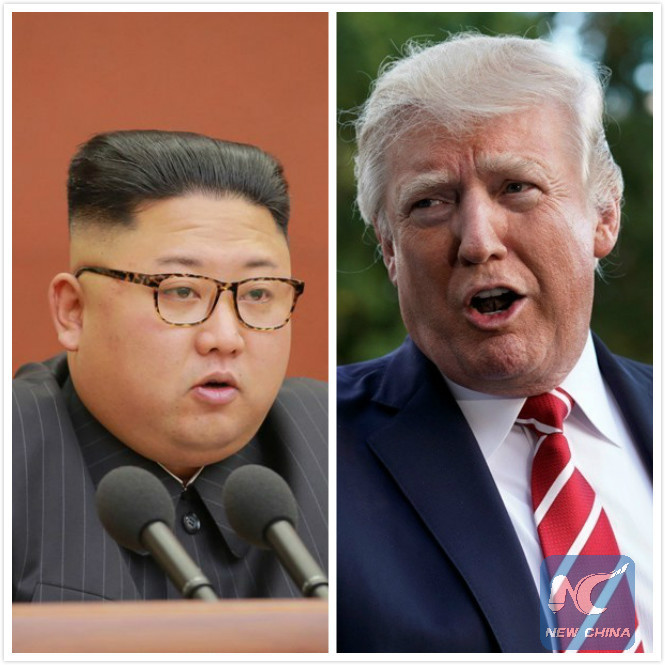
File Photo
By Xinhua writers Zhu Dongyang, Liu Chen
WASHINGTON, Jan. 3 (Xinhua) -- The current U.S. administration's recent escalation of hardline rhetoric against the Democratic People's Republic of Korea (DPRK) reveals its attempt to maintain "maximum pressure" against the Asian nation in 2018, U.S. experts said Wednesday.
NEW-YEAR EXCHANGE OF ACCUSATIONS
The White House and the DPRK have engaged in a new round of war of words at the beginning of this year.
At a press briefing on Wednesday, White House spokesperson Sarah Huckabee Sanders challenged the "mental fitness" of the DPRK's top leader Kim Jong Un.
"He's made repeated threats. He's tested missiles time and time again for years," Sanders shifted the focus to Kim when asked to explain U.S. President Donald Trump's Tuesday tweet claiming he has a "much bigger & more powerful" nuclear button than that of Kim.
Earlier on Monday, Trump also said via Twitter that sanctions and "other" pressures are beginning to have a "big" impact on Pyongyang, tauntingly calling Kim "rocket man" again.
Defending Trump's provocative statements, Sanders argued that "what's dangerous is to ignore the continued threats."
In his New Year's speech on Monday, Kim said the DPRK is capable of striking the United States with nuclear weapons at any moment, noting "the push button of nuclear weapons is on my desk."
BEHIND "SCHOOLYARD BRAVADO"
Troy Stangarone, senior director at the Korea Economic Institute, a Washington-based non-profit policy research institution founded by the South Korean government, told Xinhua that the comments of both Kim and Trump "are more rhetorical."
"While Trump's comment ... has an element of schoolyard bravado to it, it actually serves a more important purpose," Stangarone said.
"Kim has tried to give the impression that nuclear weapons make the DPRK untouchable. But Trump is trying to remind him that the United States remains far and away the stronger military power and that its new nuclear power does not give it the ability to push Washington around."
Dan Mahaffee, senior vice president of the non-profit Center for the Study of the Presidency and Congress, said the tensions between Trump and Kim reflect the divergence in both nations' interests, and that divergence is amplified by leaders willing to issue "blustery statements."
"The North Koreans see their nuclear program and missile technology as a tool to protect the survival of their regime, while the United States sees the program ... brinkmanship and blackmail -- which is all the more unacceptable when they have the means to strike at the United States," he said.
Mahaffee noted that Trump's statement about the nuclear button "is a dangerous example of this bluster between the two leaders."
"While President Trump intended to sound tough -- responding directly to Kim's statement about his nuclear capabilities and highlighting how the U.S. arsenal, conventional and nuclear, is much stronger -- this bluster is seen by many as juvenile and dangerous," he noted.
U.S. MAXIMUM PRESSURE STRATEGY
Experts argued that the Trump administration's intention underneath the current hawkish rhetoric is to maintain the current "maximum pressure" strategy against Pyongyang economically and diplomatically.
Darrell West, a senior fellow at the Washington-based think tank the Brookings Institute, said it probably is difficult for the DPRK leader to understand Trump's "unconventional" behavior.
"Trump takes quick umbrage at opponent's comments and is fast to escalate. They could lead to fundamental misunderstandings about the intentions of the other country. Taken to an extreme, that could lead to an unintended outcome," West warned.
He added that even though "Trump hopes that by talking tough on the DPRK, he can get the nation to stand down and dismantle his nuclear program; However, there is little evidence the DPRK is willing to do that so the risk of this conflict spiraling out of control is quite high."
In the eyes of Stangarone, the DPRK, faced with international sanctions that have a significant impact on its economy over time, needs to find a way to convince the international community to relieve some of the pressure.
"Trump is different than prior U.S. presidents and his rhetoric is reflective of that and his style. The heightened rhetoric is his way of signaling to North Korea the seriousness with which he takes the nuclear issue," Stangarone said.
(Matthew Rusling also contributed to the story.)

